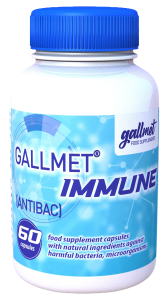Supporting the immune system and the body’s natural defences, especially in the upper respiratory tract


Garlic (Allium sativum)
contributes to maintaining intestinal microbiological balance and protection against harmful bacteria and microorganisms
- Efficacy of garlic against respiratory infections has been proven in a modern clinical trial.B16 According to a study, the prolonged preventive intake of garlic significantly reduced the risk of respiratory infections.

Elderberry (Sambucus Nigra)
supports the immune system that protects the human body
- Elderflower has been part of European folk medicine for centuries: it is used primarily for inducing sweating and in cases of fever and cold. Fruit jam made of its berries is also used as a mild laxative. More recently, the squeezed juice and extract of its berries have also been used in colds.
- The berries of the plant contain large amounts of anthocyanins (giving them their colour). These compounds have an antioxidantG5 and antiviral effect against respiratory viruses (e.g. influenza, rhino and coronavirus). They also support the immune system and thus contribute to the protection against viruses.A6 A4 A3
- Traditional studies of elderberry extract have shown that elderberry accelerates recovery and reduces symptoms in people with influenza.A4 A similar effect was observed for colds.A5 A re‑analysis (meta analysis)A9 of the results of the clinical trials confirmed the above findings.

King Of Bitters (Andrographis paniculata)
supports the body’s natural defences, especially in the upper respiratory tract

Turmeric and black pepper (Curcuma longa and Piper nigrum)
supports the immune system, lung and respiratory tract health. It provides protection against allergies and has a significant antioxidant function
- Centuries of oriental folk experience and informative scientific studies support the anti-inflammatory effect of the drug and clinical evidence to the same effect is also availableE10.
- Curcumin has an immunostimulatory effect proven in experiments: during the immune response, it enhanced the production of anti-bodies and white blood cell count.E2 But its impact on the immune system is even more complex. In the experimentally induced allergen-provoked airway obstruction, it also moderated airway narrowing in the experiments.E6

White horehound (Marrubium vulgare)
supports the intestinal tract, contributes to healthy digestion and to proper liver and bile function
- Its appetite enhancing and digestion stimulatingD1 effect is related to its bitter substance content. Bitter taste improves appetite reflexively and supports digestion by increasing the secretion of digestive fluids.

Bile acids
reduce digestive and biliary complaints caused by bile deficiency thus significantly supporting the weakened immune system. They also neutralize endotoxins released from the necrosed cell walls of Gram negative bacteria that are the cause of numerous diseases. Bile acids inhibit the spread of several strains of viruses (influenza, corona, hepatitis, herpes/Epstein Barr, HIV, EBOLA) by preventing virions from biding to the membrane of host cells, thus impeding the production of viruses, but they also break down the virion host cell bond in viruses already produced.
- ABSTRACT: Enzymatic oxidation of cholesterol generates numerous distinct bile acids which function both as detergents that facilitate the digestion and absorption of dietary lipids and as hormones that activate five distinct receptors. Activation of these receptors alters gene expression in multiple tissues, leading to changes not only in bile acid metabolism but also in glucose homeostasis, lipid and lipoprotein metabolism, energy expenditure, intestinal motility, bacterial growth, inflammation, and in the liver‑gut axis. This review focuses on the present knowledge regarding the physiologic and pathologic role of bile acids and their immunomodulatory role, with particular attention to bacterial lipopolysaccharides (endotoxins) and bile acid and immunological disorders. The specific role that bile acids play in the regulation of innate immunity, various systemic inflammations, inflammatory bowel diseases, allergy, psoriasis, cholestasis, obesity, metabolic syndrome, alcoholic liver disease, and colon cancer will be reviewed.
References:
A3 – Inhibitory activity of a standardized elderberry liquid extract against clinically-relevant human respiratory bacterial pathogens and influenza A and B viruses
Inhibitory activity of a standardized elderberry liquid extract against clinically-relevant human respiratory bacterial pathogens and influenza A and B viruses Download – PDF ABSTRACT Background: Black elderberries (Sambucus nigra L.) are well known as supportive agents against common cold and
A4 – Randomized Study of the Efficacy and Safety of Oral Elderberry Extract in the Treatment of Influenza A and B Virus Infections
Randomized Study of the Efficacy and Safety of Oral Elderberry Extract in the Treatment of Influenza A and B Virus Infections Download – PDF Introduction The influenza virus is an orthomyxovirus and causes an acute respiratory tract disease. Influenza is
A5 – Elderberry Supplementation Reduces Cold Duration and Symptoms in Air-Travellers
Elderberry Supplementation Reduces Cold Duration and Symptoms in Air-Travellers: A Randomized, Double-Blind Placebo-Controlled Clinical Trial Download – PDF Abstract Intercontinental air travel can be stressful, especially for respiratory health. Elderberries have been used traditionally, and in some observational and clinical
A6 – Inhibition of Several Strains of Influenza Virus in Vitro and Reduction of Symptoms by an Elderberry Extract (Sambucus nigra L.) during an Outbreak of Influenza B Panama
Inhibition of Several Strains of Influenza Virus in Vitro and Reduction of Symptoms by an Elderberry Extract (Sambucus nigra L.) during an Outbreak of Influenza B Panama Download – PDF Abstract A standardized elderberry extract, Sambucol® (SAM), reduced hemagglutination and
A9 – Black elderberry (Sambucus nigra) supplementation effectively treats upper respiratory symptoms
Black elderberry (Sambucus nigra) supplementation effectively treats upper respiratory symptoms: A metaanalysis of randomized, controlled clinical trials Download – PDF Abstract Upper respiratory symptoms are often treated with over the counter drugs, antibiotics, and antiviral medications. Due to concerns about
B16 – Preventing the Common Cold With a Garlic Supplement
Preventing the Common Cold With a Garlic Supplement: A Double-Blind, Placebo-Controlled Survey Download – PDF Abstract One hundred forty-six volunteers were randomized to receive a placebo or an allicin-containing garlic supplement, one capsule daily, over a 12-week period between November
C12 – A randomized double blind placebo controlled clinical evaluation of extract of Andrographis paniculata (KalmCold) in patients with uncomplicated upper respiratory tract infection
A randomized double blind placebo controlled clinical evaluation of extract of Andrographis paniculata (KalmCold) in patients with uncomplicated upper respiratory tract infection Download – PDF Abstract A randomized, double blind placebo controlled clinical study was conducted to evaluate the efficacy
C17 – Andrographis paniculata for symptomatic relief of acute respiratory tract infections in adults and children
Andrographis paniculata (Chuān Xīn LiaÂn) for symptomatic relief of acute respiratory tract infections in adults and children: A systematic review and meta-analysis Download – PDF Abstract Introduction: Antimicrobial resistance (AMR) is a substantial threat to public health. Safe and effective
C2 – Andrographis paniculata (Burm. f.) Wall. ex Nees: A Review of Ethnobotany, Phytochemistry, and Pharmacology
Andrographis paniculata (Burm. f.) Wall. ex Nees: A Review of Ethnobotany, Phytochemistry, and Pharmacology Download – PDF Conclusion The demand of AP is greatly increased in the past few years for its overwhelming therapeutic potentials. Available data on AP also
D1 – An Insight into a Blockbuster Phytomedicine; Marrubium vulgare L. Herb. More of a Myth than a Reality?
An Insight into a Blockbuster Phytomedicine; Marrubium vulgare L. Herb. More of a Myth than a Reality? Download – PDF ABSTRACT Aerial parts and the root of Marrubium vulgare L. (white horehound) have been traditionally used in Europe and in
D3 – Marrubium vulgare L.: A Phytochemical and Pharmacological Overview
Marrubium vulgare L.: A Phytochemical and Pharmacological Overview Download – PDF Abstract Marrubium vulgare is a plant with high bioactive potential. It contains marrubiin, a labdane diterpene that is characteristic for this genus, as well as a complex mixture of
E10 – Efficacy and safety of turmeric and curcumin in lowering blood lipid levels in patients with cardiovascular risk factors: a meta-analysis of randomized controlled trials
Efficacy and safety of turmeric and curcumin in lowering blood lipid levels in patients with cardiovascular risk factors: a meta-analysis of randomized controlled trials Download – PDF Abstract Background: Dyslipidemia is an important and common cardiovascular risk factor in the
E2 – Immunomodulatory activity of curcumin
Immunomodulatory activity of curcumin Download – PDF Abstract Curcumin, an active ingredient present in Curcuma longa, was analysed for the immunomodulatory activity in Balb/c mice. Curcumin administration was found to increase the total WBC count (15,290) significantly on the 12th
E6 – Curcumin Attenuates Allergen-Induced Airway Hyperresponsiveness in Sensitized Guinea Pigs
Curcumin Attenuates Allergen-Induced Airway Hyperresponsiveness in Sensitized Guinea Pigs Download – PDF ABSTRACT Anti-asthmatic property of curcumin (diferuloylmethane), a natural product from the rhizomes of Curcuma longa, has been tested in a guinea pig model of airway hyperresponsiveness. We sensitized
E7 – Curcumin attenuates allergic airway inflammation and hyper-responsiveness in mice through NF-kB inhibition
Curcumin attenuates allergic airway inflammation and hyper-responsiveness in mice through NF-kB inhibition Download – PDF ABSTRACT Ethnopharmacological relevance: Curcumin, a polyphenol compound from Curcuma longa L. has been used for centuries as an anti-inflammatory remedy including asthma. Curcumin has been
F28 – The Immunomodulatory Role of Bile Acids
The Immunomodulatory Role of Bile Acids Download – PDF ABSTRACT: Enzymatic oxidation of cholesterol generates numerous distinct bile acids which function both as detergents that facilitate the digestion and absorption of dietary lipids and as hormones that activate five distinct



